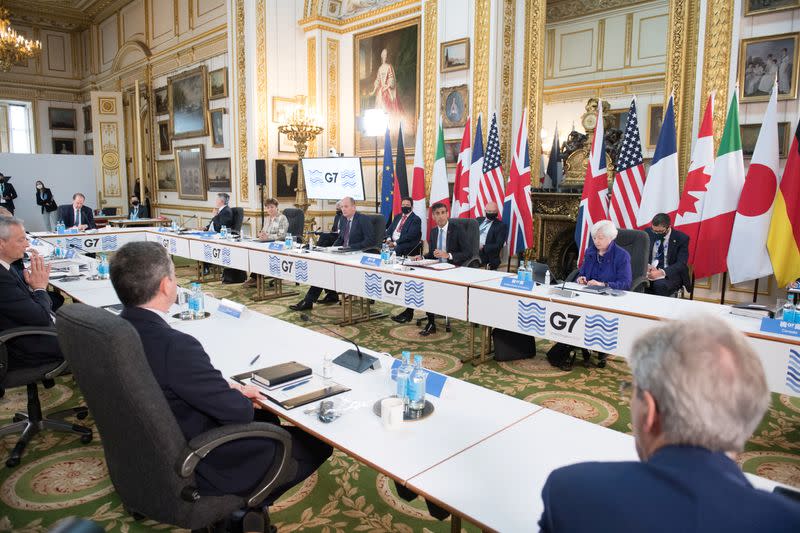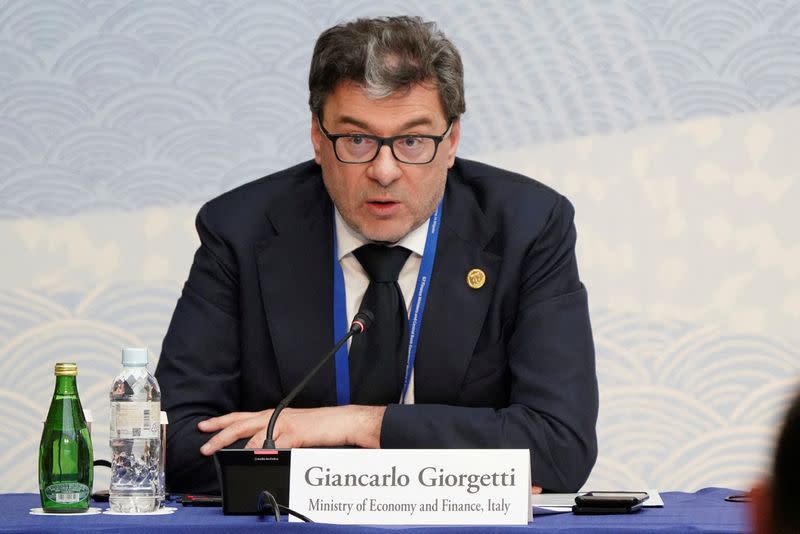G7 finance chiefs seek common line on Russian assets, China
By Gavin Jones and Giuseppe Fonte
ROME (Reuters) - G7 finance chiefs meeting in Italy this week will attempt to find common ground on pulling forward earnings on frozen Russian assets to boost funding for Ukraine's war effort and pushing back on China's growing export strength in key sectors, officials said.
Finance ministers and central bankers from the Group of Seven wealthy democracies - the United States, Japan, Germany, France, Britain, Italy and Canada - will gather in the northern Italian lakeside town of Stresa on Friday and Saturday.
G7 negotiators have been discussing for weeks how to best exploit some $300 billion worth of Russian financial assets, such as major currencies and government bonds, which were frozen shortly after Moscow invaded Ukraine in February 2022.
The United States is pushing to find a way to bring forward the future income from those assets, to back a loan that could provide it with as much as $50 billion in the near term.
However, several officials from G7 countries, including the U.S., said many legal and technical aspects need to be hammered out, and a detailed accord is not expected to be reached in Stresa.
"We're not looking for term sheets over the weekend," a senior U.S. Treasury official said, referring to legal documents that describe basic investment terms and conditions.
Instead, the official said on condition of anonymity that the G7 ministers are trying to build consensus around a plan for that would give Ukraine enough money up front to meet medium-term war and civilian needs and signal to Russia that it "cannot outlast" Western powers financially. The talks are aimed at presenting a proposal to G7 heads of government who will meet in Puglia, southern Italy, on June 13 to 15.
Who would administer the loan - the World Bank or some other body - how it would be guaranteed, how future profits can be estimated and what would happen in the event of a peace deal with Russia are all aspects still to be clarified.
European officials are particularly cautious, with one EU diplomat saying it would take "weeks if not months" for a final decision to be made.
'LEGAL IMPLICATIONS'
Italy holds the G7 presidency this year and its Economy Minister Giancarlo Giorgetti said last week the U.S. proposals on the use of the Russian assets had "quite serious legal implications" which still need clarifying.
Russia has repeatedly warned the West of consequences if its assets are touched and accused Washington of bullying Europe to take more radical steps to thwart it in Ukraine.
The prospects for global trade will be another central topic in Stresa after the United States last week unveiled steep tariff hikes on an array of Chinese imports including electric vehicle batteries, computer chips and medical products.
Giorgetti said after the U.S. move that a "trade war" was being fought reflecting geopolitical tensions and warned of the risk of "fragmentation" to global commerce.
The United States is not calling on its partners to take similar measures against China, but an official said it was likely to push for the G7 communique to express common concern for what it calls Beijing's industrial "overcapacity".
U.S. Treasury Secretary Janet Yellen said in Frankfurt on Tuesday the United States and Europe needed to address the threat from Chinese imports in a "strategic and united way" to keep manufacturers viable on both sides of the Atlantic and foster development of their domestic clean energy industries.
French Finance Minister Bruno Le Maire echoed her sentiments, saying on Wednesday that Europe and the G7 must "stand united" in the face of Chinese industrial overcapacity.
TAX TALKS
Other topics to be discussed in Stresa, according to an official programme issued by the Italian presidency, will include the impact of artificial intelligence on the global economy, and a "stocktaking" on sanctions against Russia.
Taxation will also be on the agenda, with Italy trying to revive a deal on a global minimum tax on multinationals which was signed by around 140 countries in 2021, but has not been fully implemented due to opposition in the U.S. and elsewhere.
A proposal for a global wealth tax on billionaires, which has been promoted by Brazil and France among the broader Group of 20 developed countries, would also be discussed in Stresa but was meeting U.S. resistance, one of the officials said.
(This story has been refiled to remove repeated words 'several officials said' in paragraph 5)
(Additional reporting by David Lawder in Washington and Julia Payne in Brussels; Editing by Alex Richardson)


